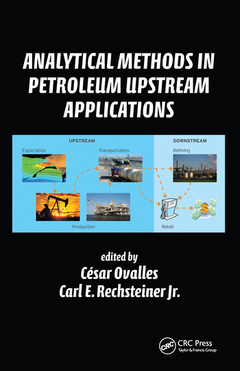Description
Analytical Methods in Petroleum Upstream Applications
Coordinators: Ovalles Cesar, Rechsteiner Jr. Carl E.
Language: English
Subjects for Analytical Methods in Petroleum Upstream Applications:
Keywords
Crude Oil; Asphaltene Content; petroleum molecular composition; Crude Oil Samples; oil-in-water monitoring; Asphaltene Precipitation; analysis of olefins; NMR Spectrum; NMR technology in petroleum; VR; NMR upstream applications; Asphaltene Deposits; advances in gas chromatography for petroleum; Asphaltene Concentrations; asphaltenes; Solubility Profile; Solubility Parameter; T2 Distribution; T2 Ratio; Heavy Crude Oil; ELSD; Ar Bo; NMR Technology; Visbroken Products; API Gravity; DPD Simulation; T2 Relaxation Time; DPD; PLS Regression; Asphaltene Solubility; Irreducible Water Saturation; Data Fusion
Publication date: 06-2020
· 15.6x23.4 cm · Paperback
Publication date: 03-2015
315 p. · 15.6x23.4 cm · Hardback
Description
/li>Contents
/li>Readership
/li>Biography
/li>
Effective measurement of the composition and properties of petroleum is essential for its exploration, production, and refining; however, new technologies and methodologies are not adequately documented in much of the current literature. Analytical Methods in Petroleum Upstream Applications explores advances in the analytical methods and instrumentation that allow more accurate determination of the components, classes of compounds, properties, and features of petroleum and its fractions.
Recognized experts explore a host of topics, including:
- A petroleum molecular composition continuity model as a context for other analytical measurements
- A modern modular sampling system for use in the lab or the process area to collect and control samples for subsequent analysis
- The importance of oil-in-water measurements and monitoring
- The chemical and physical properties of heavy oils, their fractions, and products from their upgrading
- Analytical measurements using gas chromatography and nuclear magnetic resonance (NMR) applications
- Asphaltene and heavy ends analysis
- Chemometrics and modeling approaches for understanding petroleum composition and properties to improve upstream, midstream, and downstream operations
Due to the renaissance of gas and oil production in North America, interest has grown in analytical methods for a wide range of applications. The understanding provided in this text is designed to help chemists, geologists, and chemical and petroleum engineers make more accurate estimates of the crude value to specific refinery configurations, providing insight into optimum development and extraction schemes.
Background Chapters. Petroleum Molecular Composition Continuity Model. Process and Laboratory Sampling for Analytical Systems: Similarities and Subtle Differences. Water Analysis. Advances in Oil-in-Water Monitoring Technology. Properties. Characterization of Athabasca and Arabian Light Vacuum Residues and Their Thermally Cracked Products: Implications of the Structural Information on Adsorption over Solid Surfaces. Analysis of Olefins in Heavy Oil, Bitumen, and Their Upgraded Products. Analytical Measurements. Advances in Gas Chromatography for Petroleum Upstream, Refining, Petrochemical, and Related Environmental Applications. Application of NMR Technology in Petroleum Exploration and Characterization. Nuclear Magnetic Resonance Upstream Applications: Crude Oil Characterization, Water-Oil Interface Behavior, and Porous Media. Heavy Ends and Asphaltenes. On-Column Filtration Asphaltene Characterization Methods for the Analysis of Produced Crude Oils and Deposits from Upstream Operations. Asphaltene Adsorption on Iron Oxide Surfaces. Determination of Asphaltenes Using Microfluidics. Modeling and Chemometrics. Application of Data Fusion for Enhanced Understanding and Control. Application of Computer Simulations to Surfactant Chemical Enhanced Oil Recovery. Understanding the Molecular Information Contained in the Infrared Spectra of Colombian Vacuum Residua by Principal Component Analysis.
Cesar Ovalles is Technical Team Leader at Chevron Energy Technology Company located in Richmond, California. He has a B.Sc. in Chemistry from Simon Bolivar University and Ph.D. in the same field from Texas A&M University. He worked for 16 years at Petróleos de Venezuela Sociedad Anónima-Instituto de Tecnología Venezolano del Petróleo (PDVSA–INTEVEP). In 2006, he joined Chevron to work in R&D in Petroleum Chemistry and characterization of heavy and extra-heavy Crude Oils and their fractions. He is also involved in new methods for analysis of asphaltenes and in R&D in the chemistry of heavy and extra-heavy crude oil upgrading processes.
Carl Rechsteiner is the owner of CRechsteiner Consulting LLC in Petaluma, California, providing petroleum composition and measurement advice to industry. Following a four-year stint with Arthur D. Little Inc., Dr. Rechsteiner joined Chevron Research Company in Richmond, California, where he spent the next 31 years in a number of roles involving numerous measurement technologies for elucidating petroleum compositions. He managed many research and development projects that developed and implemented measurement technologies (especially in the chromatographic and spectroscopic sciences) across Chevron’s Global Downstream laboratory organization, and created an infrastructure to support data-rich process analyzers within Chevron’s operations.




